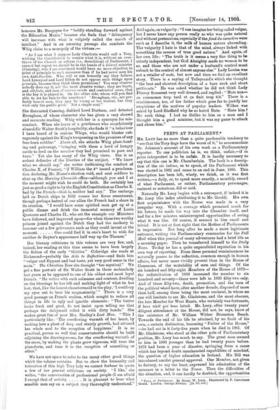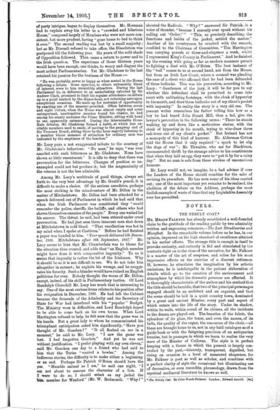PEEPS AT PARLIAMENT.*
Ma. Lucy has no more than a quite pardonable tendency to " see that the Tory dogs have the worst of it," to accommodate Dr. Johnson's account of his own work as a Parliamentary reporter. To one politician he is, we think, unfair,—if in peius interpretari is to be unfair. It is hardly necessary to say that this one is Mr. Chamberlain. The book is a descrip- tion of the vie intime, so to speak, of the Parliament which was elected in 1892 and came to an end in June, 1895. This description has been left, wisely, we think, as it was first written,—a daily, or, to speak more exactly, a monthly, record of what Parliament, or rather, Parliamentary personages, eminent or notorious, did or said.
Naturally Mr. Lucy begins with a retrospect, if indeed it is Mr. Lucy (the index attributing it to Mr. Gould). His own first acquaintance with the House was made in a very irregular way. With a courage which promised much for his future, he made his way into the Chamber itself, and had for a few minutes uninterrupted opportunities of seeing what it was like. Of course, it seemed to him small and trivial. It is not at first sight that the Mother of Parliaments is impressive. Not long after he made a more legitimate entrance, writing the Parliamentary summaries for the Pall Mall when this journal of many adventures had a brief life as a morning paper. Then he transferred himself to the Daily News. To-day he has a quite unparalleled reputation in his own way of reporting. From these personal reminiscences he naturally passes to the reflection, common enough in human affairs, but never more vividly present than in the House of Commons, of the mutability of men and things. Of the six hundred and fifty-eight Members of the House of 1873— the redistribution of 1883 increased the number to six hundred and seventy—there were left in 1893 fifty-two only. And of these fifty-two, death, promotion, and the turn of the political wheel have, after another decade, disposed of more than half, among these being the most eminent, in whom no one will hesitate to see Mr. Gladstone, and the most obscure, the late Member for West Hants, who certainly was fortunate, if bene tizit qui bene latuit. Mr. Lucy, after twenty years' diligent attendance at the House, did not, he says, know of the existence of Mr. William Wither Bramston Beach. Towards the end of his life he attained, by no fault of his own, a certain distinction, becoming " Father of the House," —he had sat in it forty-five years when he died in 1901. Of Mr. Gladstone, who stood at the other pole of Parliamentary position, Mr. Lucy has much to say. The great man seemed to him in 1893 younger than he had twenty years before. 1873 had been a year of disaster, springing from a cause which has beyond doubt unexhausted capabilities of mischief, the question of higher education in Ireland. His Bill was introduced amidst general approval. One Member, not given to flattery, to say the least, expressed his admiration of the measure in a letter to the Times. Then the difficulties of the situation, and, it can hardly be doubted, the opportunities • Peeps at Parliament. By Henry W. Lucy. Illustrated by F. Carruthers Gould. London : George Newnes. gs. 6d. net.]
of party intrigue, began to display themselves. Mr. Horsman had to explain away his letter to a " crowded and hilarious House," composed largely of Members who were not more con- sistent, but more prudent, having " gone home to bed to think
it over!' The second reading was lost by a small majority ; but as Mr. Disraeli refused to take office, the Dissolution was postponed till the following year. Six years of the cold shade
of Opposition followed. Then came a return to power and to the Irish question. The experience of those thirteen years would have been enough, one thinks, to weary and disgust the most ardent Parliamentarian. Yet Mr. Gladstone to the last retained his passion for the business of the House :—
" He was, probably, never so happy as when seated in the House following a debate. Some speeches, to others unbearably blank of interest, were to him irresistibly attractive. During the last Parliament he, in deference to an undertaking extorted by Sir Andrew Clark, promised to limit his regular attendance on debate up to a point marked by the dinner-hour, not returning save upon exceptional occasions. He made up for restraint of opportunity by exacting use of the measure provided. Often between seven and eight o'clock, when the House was almost empty and some unimportant, unattractive member found his chance, he had among his scanty audience the Prime Minister, sitting with hand to ear, apparently entranced. During the interminable Home Rule debates, Mr. Gladstone formed a habit, at which less ex- citable members used to smile, of moving to the gangway end of the Treasury Bench, sitting there by the hour eagerly listening to a member whose measure of attraction for ordinary men was indicated by the emptiness of the benches."
Mr. Lucy pays a not exaggerated tribute to the courtesy of Mr. Gladstone's behaviour. " No man," he says, " was ever
assailed with such bitterness as Mr. Gladstone. None have shown so little resentment." It is idle to deny that there was provocation for the bitterness. Changes of position so un- exampled could not but produce it; but the magnanimity of the veteran is not the less admirable.
Among Mr. Lucy's multitude of good things, always set forth to the very best advantage by Mr. Gould's pencil, it is difficult to make a choice. Of the serious anecdotes, perhaps the most striking is the misadventure of Mr. Dillon in the matter of Mitchelstown. Mr. Dillon had been attacked for a speech delivered out of Parliament in which he had said that when the Irish Parliament was constituted they " would remember the police, sheriffs, the bailiffs, and others who had shown themselves enemies of the people." Every one waited for his answer. The threat, he said, had been uttered under cruel provocation. He had just seen three innocent men shot down at Mitchelstown in cold blood. "That recollection was hot in my mind when I spoke at Castlerea." Before he had finished a paper was handed to him. "Your speech delivered 5th Decem- ber, 1886. Mitchelstown affair 9th September, 1887." Mr.
Lucy seems to hint that Mr. Chamberlain was to blame for the situation thus created, and adds that " an English member might have done it with comparative impunity." To us it seems that impunity is rather the lot of the Irishman. Why it should be so it is not difficult to see. We do not take him altogether in earnest; he exploits his wrongs, and he exagge-
rates his ferocity. Such a blunder would have ruined an English politician for ever. Nobody thought the worse of Mr. Dillon, except, indeed, of his skill in Parliamentary tactics. Of Lord Randolph Churchill Mr. Lucy has much that is interesting to say. One of the most curious items relates to his position after his resignation in December, 1886. He had left the Cabinet
because the demands of the Admiralty and the Secretary of State for War had interfered with his " popular " Budget.
The. Ministry were in difficulties, and Lord Randolph hoped to be able to come back on his own terms. When Lord
Hartington refused to help, he felt sure that the game was in his hands. But a great lady to whom he communicated his triumphant anticipation asked him significantly, " Have you thought of Mr. Goschen ? " " It all flashed on me in a moment," he said to Mr. Lucy. " I saw the game was lost. I had forgotten Goschen." And yet he was not without justification. " I prefer playing with my own eleven," said Mr. Goschen one day to a friend who had said to him that the Tories " wanted a bowler." Among the ludicrous stories, the difficulty is to make either a beginning or an end. Perhaps Sir Patrick O'Brien should have the
pas. " Humble animal as I am," he said one night, " I am not about to assume the character of a lion. If I were to do so, I should select as my jackal the hkex. member for Wexford" (Mr. W. Redmond). " Why ? " shouted the Radicals. " Why ? " answered Sir Patrick, in a voice of thunder, "because I scarcely ever speak without his calling out ' Order ! ' " " This, so precisely describing the functions and habits of the jackal, settled the matter." Another of his countrymen he crushed with the remark, confided to the Chairman of Committee, " Tim Harrington was carrying parcels at three-and-sixpence a week, whilst I represented King's County in Parliament." And he finished up the evening with going as far as modern manners permit to fighting a duel with Mr. O'Brien. The best instance of the " bull " comes to us at second hand, not from the House, but from an Irish Law Court, where a counsel was pleading the case of a client who affirmed that he had been defrauded of three bullocks. This was his peroration, according to Mr. Lucy : " Gentlemen of the jury, it will be for you to say whether this defendant shall be permitted to come into court with unblushing footsteps, with the cloak of hypocrisy in his mouth, and draw three bullocks out of my client's pocket with impunity." In reality the story is a very old one. The present writer remembers his father telling him how as a boy he had heard John Stuart Mill, then a lad, give the lawyer's peroration in the following terms : " There he stands walking up and down like a motionless statue, with the cloak of hypocrisy in his mouth, trying to wire-draw three oak-trees out of my client's pocket." But Ireland has not a monopoly of this kind of humour. Mr. Alderman Cotton told the House that it only required " a spark to let slip the dogs of war " ; Mr. Thwaites, who sat for Blackburn, recommended thrift by the strange advice to his constituents that when they laid an egg, they were to "put it by for a rainy day." But no man is safe from these strokes of unconscious humour.
Mr. Lucy would not, we imagine, be a bad adviser if ever the Leaders of the House should combine for the sake of revising its procedure. He has seen some of his ideas carried out; one of the most important yet remains to be realised, the abolition of the debate on the Address, perhaps the most foolish example of waste of time that any Legislative Assembly ever has permitted.















































 Previous page
Previous page